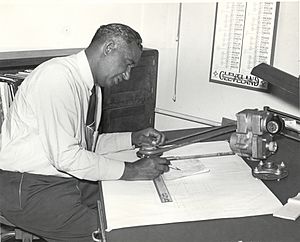Frederick McKinley Jones facts for kids
Quick facts for kids
Frederick McKinley Jones
|
|
|---|---|
 |
|
| Born | 17 May 1893 |
| Died | 21 February 1961 (aged 67) |
Frederick McKinley Jones (born May 17, 1893 – died February 21, 1961) was an amazing American inventor and a smart business person. He won the National Medal of Technology and is in the National Inventors Hall of Fame.
Frederick Jones invented new ways to keep things cold, especially for long trips. His inventions helped transport food and other items that spoil easily. He also helped start a company called Thermo King.
Contents
Early Life and Learning
Frederick Jones was born in Cincinnati, Ohio, on May 17, 1893. His father was White and his mother was Black. His mother left him when he was very young. His father tried to raise him alone.
When he was seven, he became an orphan and was raised by a priest in Cincinnati. Frederick left school after the 6th grade. At age 11, he went back to Cincinnati and got a job cleaning.
By the time he was 14, he was working as a car mechanic. He was naturally good with machines and loved to invent. He learned a lot by reading on his own and always looked for new ways to improve himself.
Starting His Career
In 1912, Frederick Jones moved to Hallock, Minnesota. There, he worked as a mechanic on a very large farm. The farm was about 50,000 acres (202 square kilometers).
After serving in the United States Army during World War I, Jones returned to Hallock. He continued working as a mechanic. He taught himself about electronics. He even built a transmitter for the town's new radio station.
He also invented a device that could combine sound with movies. This invention caught the eye of Joseph A. Numero from Minneapolis, Minnesota. In 1930, Numero hired Jones to make better sound equipment for his company, Cinema Supplies Inc.
How He Revolutionized Refrigeration
Around 1938, Frederick Jones created a special cooling unit. This unit could be put on trucks that carried food that spoils quickly. He received a patent for this invention on July 12, 1940.
Joseph Numero sold his movie sound business. He then started a new company with Jones called the U.S. Thermo Control Company. Later, this company became known as Thermo King Corporation. By 1949, it was a very successful business worth $3 million.
Jones's portable cooling units were super important during World War II. They helped keep blood, medicine, and food fresh. This was vital for army hospitals and soldiers on battlefields.
Awards and Recognitions
Frederick Jones was a very busy inventor. During his life, he was given 61 patents for his inventions. Forty of these patents were for refrigeration equipment. He also had patents for portable X-ray machines, sound equipment, and gasoline engines.
- In 1953, he received the Merit Award from the Phyllis Wheatley Auxiliary. This award was for his "outstanding achievements which serve as an inspiration to youth."
- In 1977, after he passed away, he was added to the Minnesota Inventors Hall of Fame.
- In 1991, the National Medal of Technology was given to Joseph A. Numero and Frederick M. Jones. President George H. W. Bush presented these awards. Jones was the first African American to receive this important award.
- In March 2009, Heavy Duty Truck magazine called Jones "The King of Cool." The editor, Tom Berg, wrote that Jones's inventions changed how goods were moved around the world. His work impacted everything from big cities to small villages.
His Final Years
Frederick Jones passed away from lung cancer in Minneapolis in 1961. He died before his wife, Lucille.
An article in the Saturday Evening Post said something special about him. It said, "Most engineers start at the bottom of a project and work up, but Fred takes a flying leap to the top of the mountain and then backs down, cutting steps for himself and the rest of us as he goes." This means he was a very creative and unique problem-solver. Jones kept inventing and filing for patents almost until the very end of his life.
 | Mary Eliza Mahoney |
 | Susie King Taylor |
 | Ida Gray |
 | Eliza Ann Grier |

